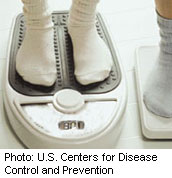- Could Your Grocery Store Meat Be Causing Recurring UTIs?
- Are You Making This Expensive Thermostat Error This Winter?
- Recognizing the Signs of Hypothyroidism
- 10 Strategies to Overcome Insomnia
- Could Artificial Sweeteners Be Aging the Brain Faster?
- Techniques for Soothing Your Nervous System
- Does the Water in Your House Smell Funny? Here’s Why
- Can a Daily Dose of Apple Cider Vinegar Actually Aid Weight Loss?
- 6 Health Beverages That Can Actually Spike Your Blood Sugar
- Treatment Options for Social Anxiety Disorder
Dieting at Young Age Often Backfires, Study Says


Dieting at a young age might set the stage for harmful health habits, including eating disorders, according to new research.
Surveys of college-age women conducted from 1982 to 2012 also found a link between early dieting and later obesity and alcohol abuse.
“The younger a woman was when she started her first diet, the more likely she was [later] to use extreme weight control behaviors — like vomiting or laxative misuse,” said study researcher Lauren Holland, a doctoral candidate in clinical psychology at Florida State University, Tallahassee.
“She was also more likely to misuse alcohol and be overweight or obese when she reached her 30s,” Holland said.
The findings are scheduled for presentation this week at the annual meeting of the Society for the Study of Ingestive Behavior in Seattle. Studies presented at medical meetings are typically viewed as preliminary until published in a peer-reviewed journal.
In 1982, 1992, 2002 and 2012 researchers asked young women, nearly 20 years old on average, about their dieting behaviors. In all, more than 2,100 college students answered the initial questions. And more than 1,300 answered the follow-up questions a decade later.
Participants were asked if they dieted, how often, when they started, and what strategies they used, such as a low-fat or low-calorie plan.
The good news? Dieting declined slightly, and the average age to start dieting rose slightly, Holland said. In 1982, it was 14.6 years; by 2012, it was 15.4.
However, in each of the four groups, “we had some who were as young as 5,” Holland said. This was uncommon, however.
In general, when initially questioned, these young women weren’t overweight.
The researchers found a link, but not a direct cause-and-effect relationship between early dieting and later negative outcomes.
“We definitely cannot say dieting causes an eating disorder,” Holland said. And the researchers didn’t calculate the extent of specific risks. However, the finding ties in with results from other studies, she said.
The researchers took into account the women’s weight at the study start and whether they used extreme weight control strategies at that time. They also factored in alcohol use at the beginning of the study.
Many factors, including genetics, play into disordered eating, or eating disorders, Holland said. If a mother diets or a child’s friends diet, that makes early dieting more likely, she said.
Other research has found that obese youth who lose a significant amount of weight risk developing eating disorders. One theory suggests they become too preoccupied with their eating.
However, not everyone who diets early in life develops an eating disorder, said Dr. Metee Comkornruecha, an adolescent medicine specialist at Miami Children’s Hospital in Florida who was not involved in the study.
He suspects some who do develop an eating disorder may have other issues, such as anxiety or obsessive-compulsive disorder.
Holland said they didn’t factor in anxiety or other psychological issues at the start of the study.
Comkornruecha said the message from the study is: Don’t discourage youth who are overweight from trying to lose it, but encourage them to lose it sensibly, if they need to. He tells overweight youth and parents “not to focus on trying to lose weight rapidly.”
Also, avoid fixating on an “ideal” weight, Comkornruecha said. “Even though there may be an ideal body weight, it is usually an ideal body weight range,” he said.
Holland would like to see parents and public health campaigns promote behaviors that increase wellness. That means increasing physical activity, decreasing “screen time” on TV and computers and eating a diet rich in fruits and vegetables.
Picking friends wisely can help, too, she said.
Since peers influence children’s and teen’s behaviors, she said, it’s wise to hang out with friends who don’t focus on diets, especially extreme diets.
More information
For more about helping kids make healthy choices, visit the American Academy of Pediatrics.
Source: HealthDay
Copyright © 2026 HealthDay. All rights reserved.










